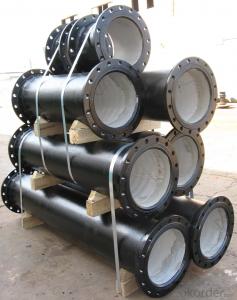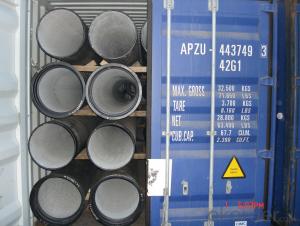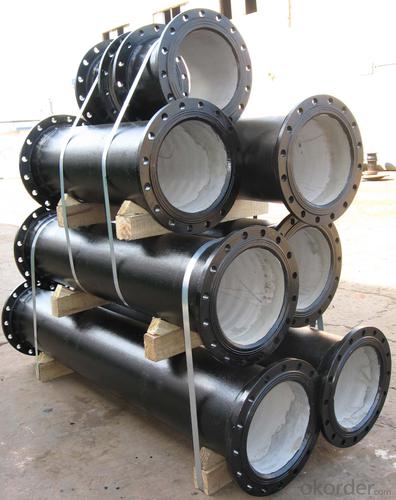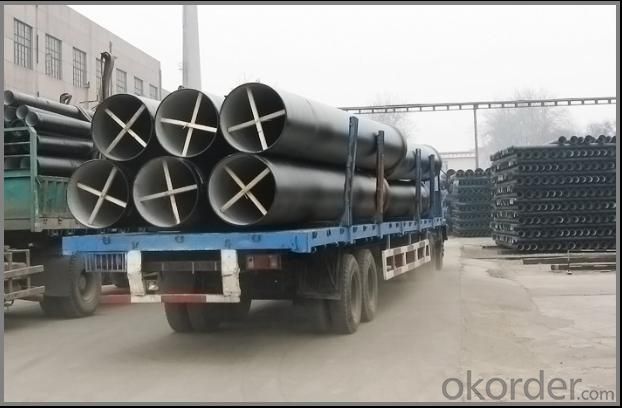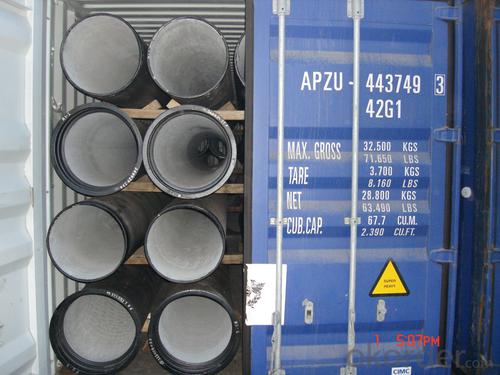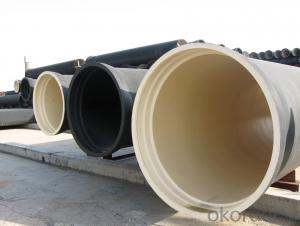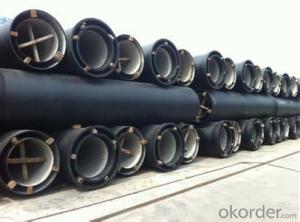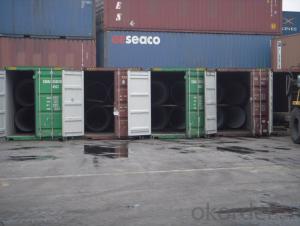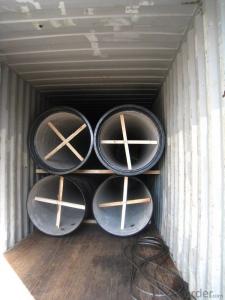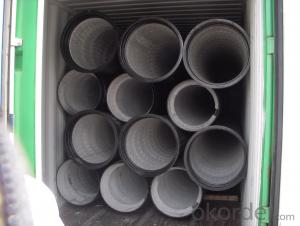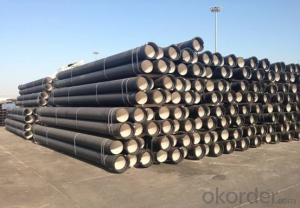DUCTILE IRON PIPES C Class DN450
- Loading Port:
- China Main Port
- Payment Terms:
- TT OR LC
- Min Order Qty:
- -
- Supply Capability:
- -
OKorder Service Pledge
OKorder Financial Service
You Might Also Like
Ductile Iron Cast Pipe is without any defects compare with tradition casting tech, which has many advantages particularly as follow:
(1) High density. In the "vertical upward casting" process, the melt iron of centre liquid column in center crystallizer is continuously feeding for volume shrinkage caused by condensation tube at outer circumference , which lead to be free of shrinkage porosity.
(2) High purity. When melt iron pouring, the mixed impurities such as gas, dross, sand grain which are lighter than melt iron could be eliminated at furnace mouth, its impossible to enter into the crystallizer through the channel, so the melt iron into the crystallizer is very pure.
(3) Strength with toughness. The cooling speed provided by continuous crystallizer is 30 times than sand casting and 5 times than centrifugal casting, and doesn't produce white iron, the eutectic cell volume of continuous cast iron is one eighth to one tenth compare with traditional cast iron. The density of graphite nodule in ductile iron can reach 300-700 pcs/mm2. Therefore, all reason above improve the strength and toughness of continuous cast iron.
(4) Free machining. The high speed cooling make the hardening phase (such as boride, steadite) not appear like reticular, massive or thick, but diffuse like fish bone and pane in shape, moreover, there are tiny graphite flakes inlaid hardening phase. It's free machining in BrinellHardness the range of 250-300HB. However, the Brinell Hardness of 250 is top limit to common metal materials.
(5) Uniform composition of tube wall. The convection mixing of liquid column caused by marching type drawing in crystallizer make the composition of tube wall well-distributed, and concentration gradient very little.
(6) High productivity. To the wall thickness of tube under 10mm, the speed of continuous casting is 1 meter/min, to the wall thickness of tube under 20mm, the speed of continuous casting is 0.5 meter/min, which is high efficiency that centrifugal or other casting tech couldn't reach.
- Q: What is the lifespan of ductile iron pipes?
- The lifespan of ductile iron pipes can vary depending on various factors such as the quality of the pipes, the environment they are installed in, and the level of maintenance they receive. However, on average, ductile iron pipes have a lifespan of approximately 80-100 years.
- Q: What are the different pressure classes available for ductile iron pipe?
- The different pressure classes available for ductile iron pipe include Class 100, Class 150, Class 200, Class 250, Class 300, Class 350, and Class 400.
- Q: How are ductile iron pipes manufactured?
- Ductile iron pipes are manufactured through a process known as centrifugal casting, which involves the use of a spinning mold. The process begins with the selection and preparation of high-quality ductile iron, which is a type of cast iron that contains small amounts of magnesium to enhance its strength and ductility. First, the ductile iron is melted in a furnace at extremely high temperatures. Once the molten iron reaches the desired temperature, it is poured into a spinning mold. The spinning mold is designed in the shape of a pipe, and it rotates at a high speed to distribute the molten iron evenly along its inner surface. As the mold spins, the molten iron cools and solidifies against the mold walls. This rapid cooling results in a fine-grained structure and enhances the mechanical properties of the pipe, such as its strength and durability. The spinning mold continues to rotate until the pipe has completely solidified, which typically takes a few minutes. After solidification, the pipe is removed from the mold, and excess material, known as the "skin," is removed. The skin is typically removed by machining or grinding to achieve the desired dimensions and surface finish. Next, the pipe undergoes heat treatment to further enhance its mechanical properties and reduce internal stresses. Once the heat treatment is completed, the pipe is thoroughly inspected for any defects or imperfections. This includes visual inspections, non-destructive testing methods, and pressure testing to ensure the pipe meets the required specifications and standards. If any defects are detected, the pipe may be repaired or rejected depending on the severity of the issue. Finally, the pipes are coated with a protective layer to prevent corrosion and enhance their longevity. This coating can be applied through various methods, such as cement mortar lining, epoxy coating, or zinc coating. Overall, the manufacturing process of ductile iron pipes involves melting the iron, centrifugal casting, cooling, skin removal, heat treatment, inspection, and coating. This process ensures the production of high-quality pipes that possess excellent strength, durability, and resistance to corrosion.
- Q: Are ductile iron pipes resistant to alkaline attacks?
- Yes, ductile iron pipes are generally resistant to alkaline attacks. Ductile iron is known for its durability and corrosion resistance, making it suitable for various applications including water and wastewater systems. Alkaline substances, such as high pH levels in water or chemicals, can potentially cause corrosion in certain metals, but ductile iron has been specifically designed to withstand these conditions. Its composition, including the addition of alloying elements like nickel and chromium, enhances its resistance to alkaline attacks. Additionally, ductile iron pipes are often lined with protective coatings, such as cement mortar or polyethylene, further enhancing their resistance to alkaline substances. However, it is important to note that the specific resistance of ductile iron pipes to alkaline attacks can depend on factors such as the concentration and duration of exposure to alkaline substances, as well as the presence of other corrosive agents. Therefore, it is always advisable to consult with manufacturers or industry experts to ensure the suitability of ductile iron pipes for specific alkaline environments.
- Q: Do ductile iron pipes require internal linings or coatings?
- Ductile iron pipes do not typically require internal linings or coatings. Ductile iron is known for its inherent corrosion resistance, which is primarily due to its composition and microstructure. The iron in ductile iron pipes is treated with magnesium, resulting in the formation of graphite nodules that give the material its ductile properties. This microstructure also provides a protective layer on the surface of the pipe, which helps to prevent corrosion. Additionally, ductile iron pipes have been used for several decades without the need for internal linings or coatings, proving their durability and resistance to corrosion. The smooth interior surface of ductile iron pipes also helps to minimize friction and maintain efficient flow rates. However, in certain cases where the conveyed fluid is highly corrosive or abrasive, or if the water quality is aggressive, internal linings or coatings may be recommended. These linings or coatings can be applied to protect the pipe from chemical attack or to prevent the leaching of iron into the water supply. Ultimately, the decision to use internal linings or coatings on ductile iron pipes depends on various factors such as the specific application, water quality, and local regulations. Consulting with professionals in the field, such as engineers or pipe manufacturers, can provide more tailored advice for specific scenarios.
- Q: What is the typical diameter range of ductile iron pipes?
- The typical diameter range of ductile iron pipes is between 4 inches and 64 inches.
- Q: Can ductile iron pipe be used for hydropower systems?
- Ductile iron pipe is perfectly suitable for hydropower systems. It is renowned for its robustness, longevity, and ability to resist corrosion, making it an excellent option for numerous applications, including hydropower systems. The remarkable tensile strength of ductile iron enables it to endure the immense pressure and heavy loads associated with such systems. Additionally, its resistance to corrosion makes it ideal for use in water environments, ensuring a lengthy lifespan and minimal maintenance requirements. Consequently, ductile iron pipe can effectively serve hydropower systems by offering a dependable and efficient solution for water transportation and infrastructure support.
- Q: What is the expected joint deflection of ductile iron pipes?
- The expected joint deflection of ductile iron pipes depends on various factors such as the diameter, wall thickness, and type of joint used. However, in general, ductile iron pipes are designed to have a joint deflection capability of up to 5 degrees for restrained joints and up to 10 degrees for flexible joints.
- Q: What is the expected deflection capability of ductile iron pipes?
- The expected deflection capability of ductile iron pipes is typically quite high compared to other pipe materials. Ductile iron pipes have a flexible nature that allows them to withstand external loads and stresses without breaking or cracking. This flexibility enables the pipes to deflect under pressure, absorbing the force and redistributing it evenly along the pipe's length. The specific deflection capability of ductile iron pipes can vary depending on factors such as pipe diameter, wall thickness, and soil conditions. However, in general, ductile iron pipes can typically deflect up to 2% to 5% of their diameter without causing any significant damage or compromising their structural integrity. This deflection capability allows the pipes to adapt to ground movement, thermal expansion, and other external forces, making them highly resilient and reliable for various applications. It is important to note that the deflection capability of ductile iron pipes should be considered in conjunction with other design criteria, such as the depth of the pipe burial, trench width, and backfill material. Following proper installation practices and adhering to industry standards and specifications will ensure that the expected deflection capability of ductile iron pipes is optimized and maintained throughout their service life.
- Q: How long do ductile iron pipes last?
- Ductile iron pipes possess an impressive durability and extended lifespan. Typically, these pipes can endure from 80 to 100 years, with certain instances even reaching an impressive 150 years. The exceptional longevity of ductile iron pipes can be attributed to their sturdy construction, enabling them to withstand high-pressure surroundings, combat corrosion, and endure severe weather conditions. Furthermore, ductile iron pipes have established a commendable reputation for their reliability and performance, rendering them a favored option for water and wastewater infrastructure projects worldwide. By conducting regular inspections and implementing maintenance measures, the lifespan of ductile iron pipes can be further prolonged, assuring their continued service for numerous decades to come.
Send your message to us
DUCTILE IRON PIPES C Class DN450
- Loading Port:
- China Main Port
- Payment Terms:
- TT OR LC
- Min Order Qty:
- -
- Supply Capability:
- -
OKorder Service Pledge
OKorder Financial Service
Similar products
Hot products
Hot Searches
Related keywords
